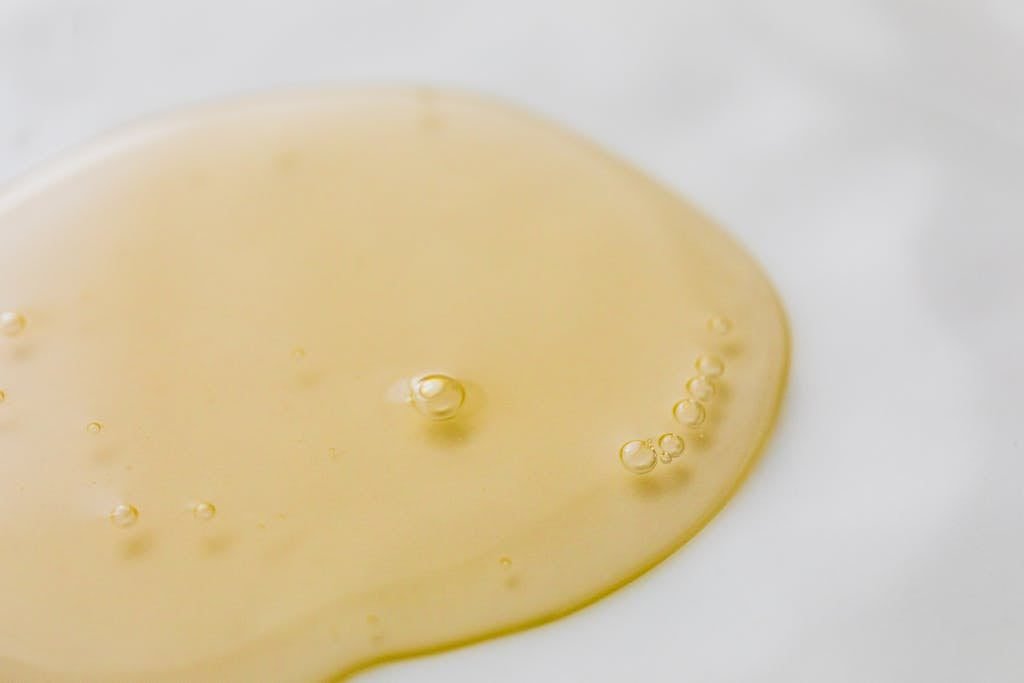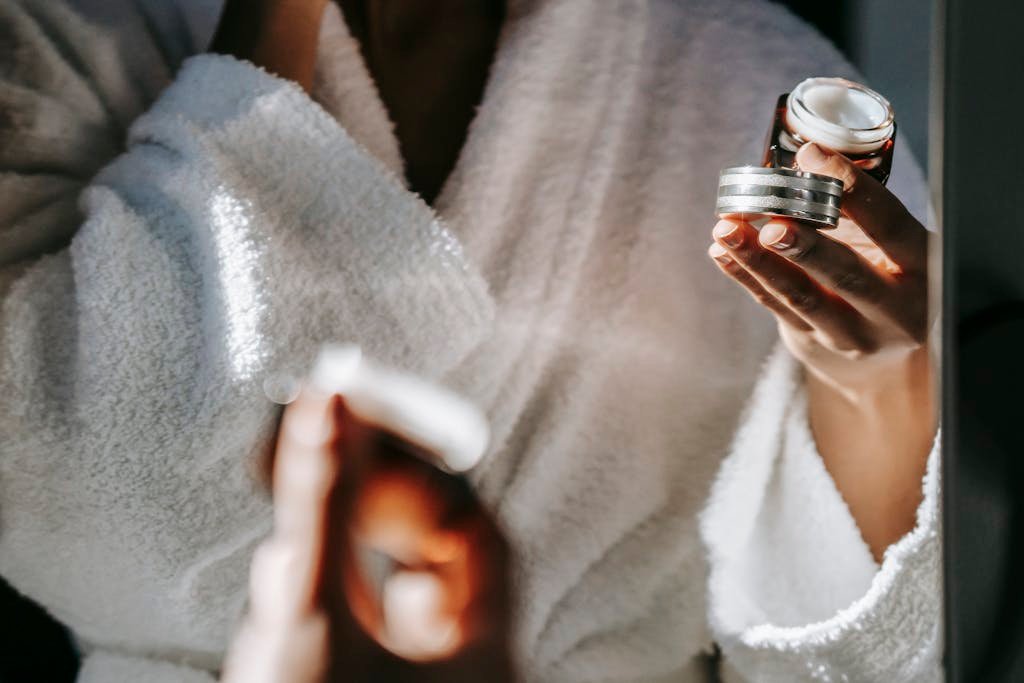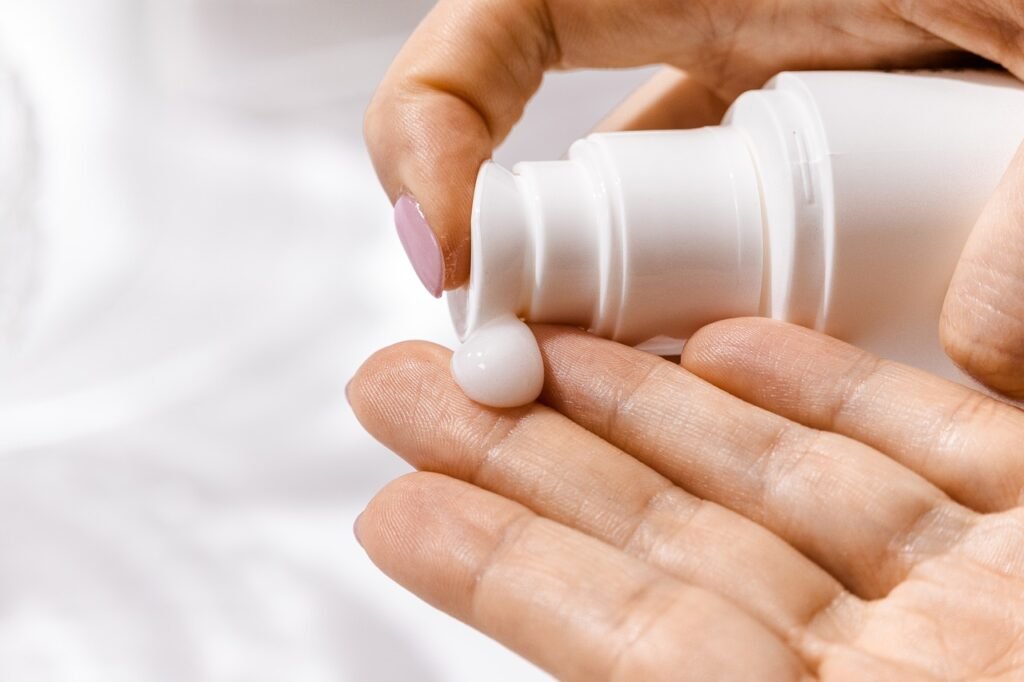If you’re on a journey to clearer skin, I’m sure you’ve probably heard of countless remedies and treatments. From fancy serums to DIY masks, the options are endless, and can be overwhelming.
However, amidst this wide variety of choices, there’s still one ingredient that often gets overlooked in the fight against acne: HYALURONIC ACID.
We will be exploring the remarkable benefits of hyaluronic acid and hyaluronic acid benefits for acne-prone skin. So, if you’re tired of battling breakouts and longing for a complexion that’s both clear and radiant, stick around. We’re about to uncover the wonder of hyaluronic acid.

What is Hyaluronic Acid?
Before we dive into the fascinating benefits of hyaluronic acid for acne, let’s start by unraveling the mysteries behind this skincare superhero.
Hyaluronic acid, often hailed as the “hydration hero,” is a natural substance found in our skin, eyes and connective tissues. It plays a crucial role in maintaining moisture levels. Imagine it as a moisture magnet, drawing in and retaining water molecules to keep our skin plump and hydrated.
How does Hyaluronic Acid Work?
But how exactly does hyaluronic acid work its magic?
Well, let’s break it down. Our skin consists of multiple layers, with the outermost layer, known as the epidermis, acting as a barrier against external aggressors like pollution and UV radiation. Within the epidermis lies the dermis, a deeper layer containing a network of collagen, elastin, and, you guessed it, hyaluronic acid.
Hyaluronic acid’s primary function is to bind to water molecules and maintain moisture within the skin. As a humectant, it draws water from the environment and deeper layers of the skin, ensuring optimal hydration levels. This not only helps to keep our skin soft and supple, but also contributes to its overall health and resilience.
But don’t just take my word for it.
Numerous studies have highlighted the efficacy of hyaluronic acid in improving skin hydration, elasticity, and overall appearance. According to a study published in the Journal of Clinical and Aesthetic Dermatology, topical application of hyaluronic acid has been shown to significantly increase skin hydration and reduce the appearance of fine lines and wrinkles.
Benefits of Hyaluronic Acid for Acne
As we already know how well-praised hyaluronic acid is for its hydrating properties, but how does hyaluronic acid’s benefit extends to helping acne?
Acne is often caused by excess sebum production, clogged pores, and inflammation, which often leads to acne scars.
But here is where Hyaluronic acid comes into play in its benefits for acne:
Hydration
We all know that hydrated skin is happy skin, and hyaluronic acid is like a glass of water for your skin.
Hyaluronic acid provides lightweight hydration while being non-comedogenic. This helps regulate sebum levels, preventing pores from becoming congested and reduces breakouts.
By attracting and retaining moisture, hyaluronic acid keeps your skin plump, dewy, and radiant.
Dehydrated skin can exacerbate acne symptoms, leading to increased inflammation and potential scarring.
By keeping the skin adequately hydrated, hyaluronic acid strengthens the skin’s natural barrier, preventing moisture loss and promoting overall skin health, making it better equipped to ward off acne and maintain its overall health and resilience.
Anti-Inflammatory properties
Hyaluronic acid’s anti-inflammatory properties, further enhance its effectiveness in soothing acne-prone skin.
Inflammation is one of the key contributors of acne, leading to redness, swelling, and discomfort. Inflammation can leave your skin feeling irritated and uncomfortable.
Hyaluronic acid’s ability to calm inflammation alleviates these symptoms and also promotes a more comfortable and balanced complexion.
But how does hyaluronic acid achieve this, you may ask?
Its unique ability to attract and retain moisture creates an environment where inflammation struggles to thrive, promoting a calmer and healthier complexion.
Supporting Skin Healing
When your skin is in need of healing, whether it’s from acne flare-ups or other irritations, this is where hyaluronic acid comes into play, acting as a nurturing companion for your skin’s recovery journey.
Hyaluronic acid’s ability to accelerate wound healing by promoting tissue repair and regeneration. This means that hyaluronic acid not only soothes inflamed skin but also actively helps it heal faster.
Its hydrating properties create an optimal environment for skin repair, ensuring that your skin bounces back quicker and stronger.
But the benefits of hyaluronic acid for acne don’t stop there.
Hyaluronic acid also acts as a protective barrier, shielding your skin from external aggressors that could impede the healing process.
By forming a barrier over the skin’s surface, hyaluronic acid helps lock in moisture and create an ideal environment for healing to occur.
Whether you’re dealing with acne scars, or irritation, or simply want to speed up the healing of blemishes, incorporating hyaluronic acid into your skincare routine can make a noticeable difference.

Who Can Benefit from Hyaluronic Acid?
The good news about this amazing skincare ingredient is that it works beautifully well with all skin types. Yes, all skin types are welcome!!
1. Dry Skin: Dry skin types crave hydration, making hyaluronic acid a perfect friend in their skincare routine.
- With its remarkable moisture-retaining properties, hyaluronic acid deeply hydrates parched skin, restoring suppleness and elasticity.
- Dry skin individuals can rejoice in the replenishing effects of hyaluronic acid, which helps alleviate tightness and discomfort.
2. Oily Skin: Contrary to popular belief, oily skin types can also benefit from hyaluronic acid’s hydrating properties e
- Lightweight and non-comedogenic formulations ensure that hyaluronic acid won’t clog pores or exacerbate oiliness.
- By providing balanced hydration, hyaluronic acid helps regulate sebum production, preventing excess oil production without stripping the skin of its natural moisture.
3. Combination Skin: Combination skin presents a unique challenge, with some areas being dry while others are oily.
- Hyaluronic acid’s adaptable nature makes it an ideal solution for combination skin, delivering hydration where it’s needed most without overloading oily areas.
- By maintaining optimal moisture balance, hyaluronic acid ensures that combination skin remains hydrated, balanced, and blemish-free.
4. Sensitive Skin: Sensitive skin requires gentle yet effective skincare ingredients, and hyaluronic acid fits the bill perfectly.
- With its soothing and calming properties, hyaluronic acid helps alleviate redness, irritation, and inflammation.
- Sensitive skin individuals can rest assured that hyaluronic acid formulations are generally well-tolerated and unlikely to cause adverse reactions.
Check out the article If you need to know other benefits of hyaluronic acid for dry eyes, joint pain etc
Hyaluronic Acid Formulations: Finding the Perfect Fit for Your Skin
Deciding on what hyaluronic acid formulations to go with can be overwhelming, with the countless number of products available on the market. Fear not, I am here to guide you on the different topical products hyaluronic acid comes in.
Types of Hyaluronic Acid Formulations:
1. Serums:
- Serums are concentrated formulations designed to deliver potent doses of hyaluronic acid deep into the skin.
- Lightweight and fast-absorbing, hyaluronic acid-based serum penetrate the skin’s surface to provide immediate hydration and plumping effects.
- Ideal for all skin types, serums can be easily incorporated into existing skincare routines.
2. Moisturizers:
- Hyaluronic acid moisturizer provides long-lasting hydration and help maintain the skin’s moisture barrier.
- These formulations are perfect for individuals with dry or dehydrated skin, offering intense hydration without feeling heavy or greasy.
- Look for moisturizers with hyaluronic acid as a key ingredient to keep your skin soft, supple, and hydrated throughout the day.
3. Sheet Masks:
- Sheet masks soaked in hyaluronic acid solutions is a great treatment for thirsty skin.
- These masks adhere closely to the skin, allowing the hyaluronic acid to penetrate deeply and provide instant hydration.
- Hyaluronic acid sheet masks leave the skin feeling refreshed, plumped, and rejuvenated.
4. Eye Creams:
- Hyaluronic acid eye creams target the delicate skin around the eyes, addressing fine lines, wrinkles, and puffiness.
- Formulated to be gentle yet effective, these creams hydrate and firm the under-eye area, leaving it looking brighter and more youthful.
- Incorporating a hyaluronic acid eye cream into your skincare routine can help reduce signs of fatigue and promote a more radiant appearance.
5. Cleansers:
- Hyaluronic acid cleansers help in removing dirt, oil, and makeup without stripping the skin of its oil. This ensures that skin stays deeply hydrated while still maintaining a healthy skin barrier.
- The cleanser is the first and most important step of the skincare routine, as it sets the stage for other products afterward, so you can never go wrong with a hyaluronic acid cleanser.
6. Oral Supplements:
- Hyaluronic acid can also be found in dietary supplements by itself or combined with other ingredients like collagen or vitamin C.
- You can also reap the benefits of hyaluronic acid from hyaluronic acid supplements. Like they say, beauty from the inside out

Integrating Hyaluronic Acid into Your Skincare Regimen
So, what should your skincare routine look like when incorporating hyaluronic acid?
- Cleansing: Do opt for a gentle cleanser that preserves your skin’s natural moisture balance. When possible, seek out formulations enriched with hyaluronic acid to infuse your skin with hydration right from the start.
- Toning: Select an alcohol-free toner infused with hyaluronic acid to rebalance your skin’s pH levels and prime it for enhanced absorption of subsequent products.
- Serum: Apply a hyaluronic acid serum post-cleansing and toning to damp skin, as this helps the serum absorb better, and lock in all the moisture, leaving skin feeling hydrated.
- Moisturize: Seal moisture in with a lightweight non-comedogenic moisturizer with or without hyaluronic acid to lock in moisture and maintain your skin’s softness and suppleness throughout the day.
- Sun protection: Shield your skin from harmful UV rays to prevent further damage. Choose a broad-spectrum sunscreen with a minimum SPF 30.
- Treatment: Treat your skin with a hydrating mask once or twice weekly to add an extra boost of moisture. Select masks boasting hyaluronic acid as a key component to revitalize and plump your complexion.
Luckily, hyaluronic acid is usually formulated with other powerful active ingredients, so this makes it super easy to incorporate into your skincare routine.
Key Point:
Hyaluronic acid can cause drier skin in people with dry skin, especially in dry climates. It works by pulling moisture from air to the skin, so in dry climates it has to pull out moisture from the skin, making dry skin worse.
Hyaluronic acid is best applied on damp skin to combat this issue, for best results.
Bottom Line
There are undeniable benefits of hyaluronic acid for acne-prone skin such as hydration, healing, and inflammation reduction. Hyaluronic acid is a skincare superstar that caters to the needs of all skin types. Whether you’re dealing with dryness, oiliness, combination concerns, or sensitivity, hyaluronic acid offers a hydrating solution that promotes healthy, radiant skin.
Integrating it into skincare routines can be done easily with the numerous forms hyaluronic acid comes in. Whether you prefer lightweight serums, nourishing moisturizers, indulgent sheet masks, or targeted eye creams, there’s a hyaluronic acid formulation that’s perfect for you.
By understanding the unique benefits of each formulation, you can harness the power of hyaluronic acid to achieve hydrated, radiant, and rejuvenated skin.
Leave your questions or comments 🙂





Leave a Reply